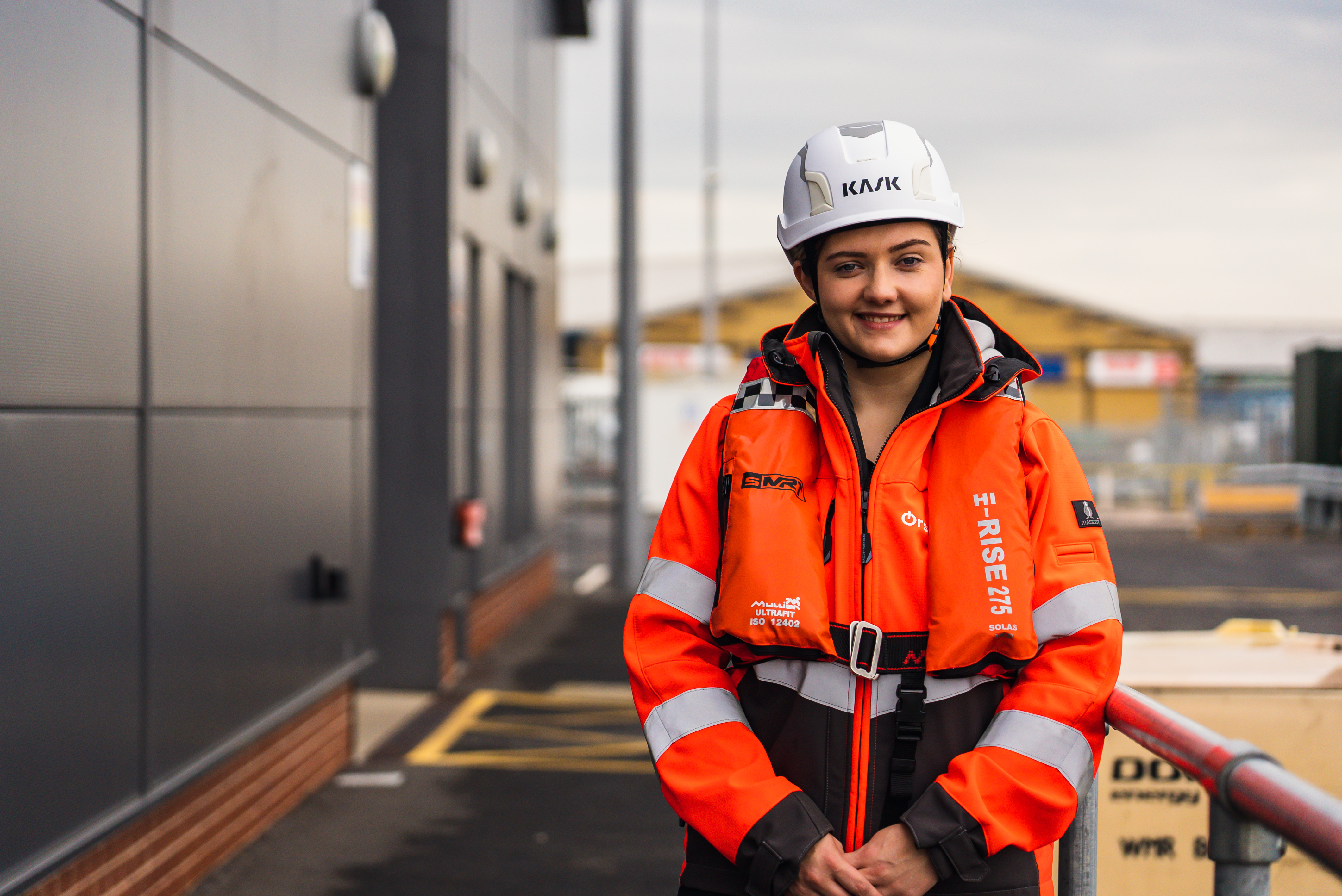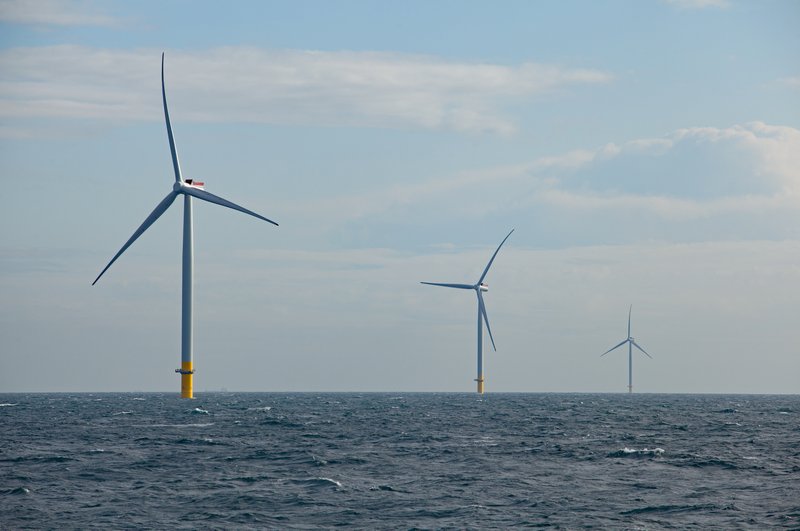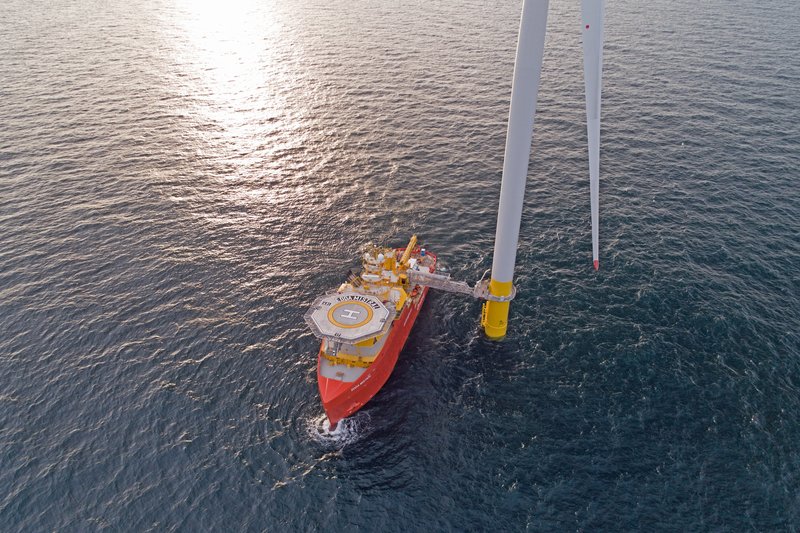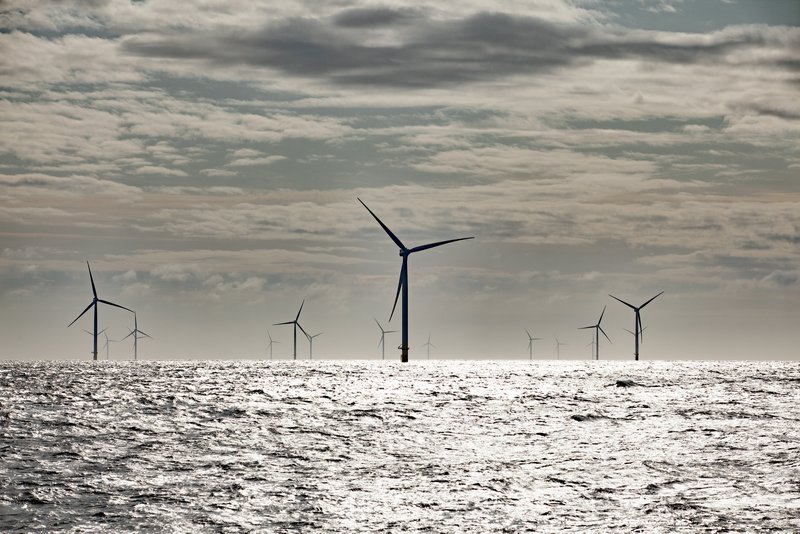"It's a joy to come to work”
No matter what job you learned after school. If you are passionate about being part of the renewable energy community, just do it. Haidee Barclay from Scotland was inspired to work on one of the world’s largest offshore wind farms, run by Danish company Ørsted, after watching a documentary. Guess what - she is now an apprentice at Hornsea 1 and loves it.
Haidee, can you tell me where you are as we speak?
I am at the Hornsea 1 offshore wind farm, one of the largest offshore wind farms in the world. It's off the coast of Yorkshire, UK, in the North Sea. I actually live in Scotland.
Quite a long journey to get to work.
Yes, I drive from Scotland to Grimsby, Ørsted's East Coast Hub. Since November I've been working on a two-week on, two-week off basis, living on a Service Operation Vessel (SOV, which is like a floating hotel).
Hornsea 1 consists of 174 wind turbines with a combined capacity of 1.2GW. Enough energy to power more than one million homes. More than 370 people work at the wind farm, which is owned by Ørsted and Jupiter Offshore Wind Limited. You are currently an apprentice at Ørsted, training to become a wind turbine technician. What is a normal day like for you?
In general, no two days are the same. The first two weeks of this shift I have been troubleshooting.  We've done various tasks such as changing pumps in the hydraulic station, replacing fans and topping up cooling systems. The only thing that's the same is the time I get up in the morning.
We've done various tasks such as changing pumps in the hydraulic station, replacing fans and topping up cooling systems. The only thing that's the same is the time I get up in the morning.
What do the British think about offshore wind?
When I go home and talk about the wind turbines and how they can power homes, people are amazed. There is a growing awareness of offshore wind. The people I talk to are very enthusiastic about it.
And especially in Grimsby there's a positive buzz around offshore wind because it was a fishing town that had gone into a decline and then this new thing came in. They argued, how's this going to create jobs? How is it going to bring in money? But then actually the amount of community support has been so positive. We see it with our apprenticeships too. I think we had about 400 applicants last year.
It wasn't your first choice to become a mechanic after school, was it?
While I was at school I worked in a five star salon in Ayr. I did that for about a year and then I left school and went into hairdressing full time. I did my apprenticeship and was a senior stylist for about seven years.
What inspired you to switch from hairdressing to wind turbine mechanics?
I was watching a BBC programme called Powering Britain. I was just sitting there one night, and we put it on and my partner actually works in the wind industry, so we're both quite interested in just finding out more. So, we watched the series and then one of the episodes featured Ørsted itself and that was just a light bulb moment for me. I was just watching a show and I was just in awe of everything. I just loved every aspect of it and that's kind of what started my drive to start applying for apprenticeships.
What were the biggest challenges you had to overcome to get your chance at Hornsea One?
First of all, I applied to Ørsted and was rejected. But that was only because I didn't have any relevant experience.
Did you try to get an apprenticeship elsewhere?
You can't put all your eggs in one basket, as they say, so I applied for a few other jobs, but Ørsted was the one I wanted. So I went straight back to the drawing board. I looked at my local college, Ayrshire College, and they offered a course called "Wind Turbine Systems". This gave me the beginning knowledge about the technician role, and the qualification at the end went straight on my CV and then a year later I could apply to Ørsted and I was successful.
the one I wanted. So I went straight back to the drawing board. I looked at my local college, Ayrshire College, and they offered a course called "Wind Turbine Systems". This gave me the beginning knowledge about the technician role, and the qualification at the end went straight on my CV and then a year later I could apply to Ørsted and I was successful.
But I think probably the other biggest change I've had to make in my life was moving away from home for the whole year and just travelling back and forth on the weekends to see family and stuff. But now that I'm on the two weeks off, two weeks on rotation, I'm absolutely loving it. I love the time at home.
How long does it take to complete your apprenticeship?
At the moment the guideline for apprenticeships is four years, so we're on the apprenticeship programme for four years and then we apply for a job.
So you're trying to stay with Hornsea One after your apprenticeship?
Yes, I’d love to.
Being a senior hair stylist for so many years and then starting something new is also a financial risk, yes. Did you have a support system?
I have a really supportive family. My partner and my mum and our whole family are just supportive.  They were a bit shocked at first because, as you say, I had been in hairdressing for so long and they just thought that was probably me. And then one day I just came out with this career change. They probably thought I was a bit crazy but they were so supportive. If I needed anything, they were there. I think it would have been a bit more of a struggle if they hadn't been like that, but I don't think it would have stopped me.
They were a bit shocked at first because, as you say, I had been in hairdressing for so long and they just thought that was probably me. And then one day I just came out with this career change. They probably thought I was a bit crazy but they were so supportive. If I needed anything, they were there. I think it would have been a bit more of a struggle if they hadn't been like that, but I don't think it would have stopped me.
Did you have to deal with any concerns from your family or friends?
Obviously Grimsby is a long way away and working away from home for two weeks, that was probably more the thing that people were a bit nervous about. You know, like missing family and not being able to do things all the time. But just showing them the programme and seeing how passionate I was, that just helped to change their minds.
They were on board the minute they saw how passionate I was about it.
Why do you think you didn't consider becoming a technician when you were at school?
I was always a very practical learner at school. I loved cooking and I loved doing woodwork and art and things like that. At school it was more hair and beauty for the girls and mechanical and electrical things for the boys. Of course it's not like that now. We're doing a lot of work with Ørsted going into all the schools and there are so many girls who are now empowered to just go out and do engineering.
For me it was one or the other and at that time I didn't really know that being a wind turbine engineer was an option. We're from a small village and there were turbines around, but maybe I just thought they ran themselves.
After the mindset shift from watching the programme and getting so excited about it, that's then drove me.
How many people are there in your apprenticeship?
We have had 76 apprentices through the UK programme, with 26 now in full time roles. Almost half of my year group are women.
What advice would you give to those considering a career change?
I think the best advice I would give someone personally is that if you're passionate enough about a career change, just go for it. Your nerves are natural, but they're what drive you on and just keep going. If you get somebody who's maybe a bit negative about your change, just show them how passionate you are. Just keep going, don't give up. And if you get knocked back the first time, don't let it knock your confidence, let it kick start your confidence and go and find other skills that maybe you're lacking or need to build on just to get that little edge. Don't give up.
After all your struggles and changes, can you describe your thoughts and feelings when you work on these wind farms?
I'm excited, still a bit nervous sometimes but hopefully that will go away soon, or maybe never. You're  still learning every day. So no, it's super exciting. You get a different job every day and it's a joy to come to work. I think that's probably the best way to put it, you look forward to coming to work. I think that's probably the best thing.
still learning every day. So no, it's super exciting. You get a different job every day and it's a joy to come to work. I think that's probably the best way to put it, you look forward to coming to work. I think that's probably the best thing.
Before, when I was a hairdresser, I often thought about whether I really wanted to go to work. You can lack that motivation, but I think when you're passionate about something, the motivation for your work is what gets you up in the morning. And it's super exciting for me anyway.
You have just won some awards - congratulations. What does it mean to you?
Oh, it's so inspiring and also empowering. I just can't believe I've had any recognition at all. Every time Charli Parkin, the UK media relations manager at Ørsted, or one of the other teams gets in touch with me, I just think, gosh, how do people know about this? So, no, it's really empowering, and it makes you feel like you've made the right decision, not only because I enjoy what I do, but also because you can inspire other people to come into the industry and share that story. Anything is possible if you make it happen.
Who inspires you?
I don't think there's any one person in particular that inspires me. I think just everybody that I work with, the whole company. To be honest, everybody that is on our shift is so inspiring and everybody helps you as much as they can. And it's just such a caring place to be as well.
Feels like a second family. I think it'd be unfair to pick just one person.
Thank you very much!


Social Media